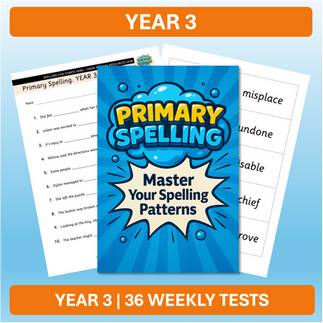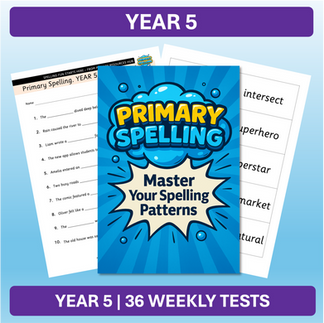📝 How to Improve Spelling Outcomes in Primary Pupils
- Primary Resources Hub

- Nov 16, 2025
- 2 min read
Updated: Nov 20, 2025

Support at school and home using simple, effective strategies...
Spelling can feel like a minefield for young learners—and a mystery for the adults trying to help them! Whether you’re a teacher juggling curriculum coverage or a parent navigating weekly word lists, the good news is: spelling success is possible with the right tools and strategies.
In this blog, we’ll explore tried-and-tested methods for improving spelling outcomes, and show how the Primary Spelling programme can transform weekly spelling routines into confidence-boosting learning moments.
🎯 1. Focus on Patterns, Not Just Lists
Instead of giving children long, disconnected lists of words to memorise, help them explore spelling rules and patterns. When children understand why words are spelled a certain way, they’re more likely to remember them—and apply the rule in unfamiliar contexts.
🧠 Try this: Discuss the spelling pattern first (e.g. -tion, -ing, double consonants) before practising the words.
💡 Primary Spelling includes: clear weekly explanations of each pattern so that children build understanding as they go.
🔁 2. Build in Repetition with Purpose
Children need to see, say, and write words multiple times—but this doesn’t have to be boring! A mix of activities helps reinforce memory.
🎨 Try this at home or school:
Write each word in a rainbow of colours
Make a mini quiz or word hunt
Say the word aloud as they write
📄 Primary Spelling provides: Look–Cover–Write–Check sheets, printable cards, and engaging test formats to keep things varied and meaningful.
🗣 3. Use Spelling in Context
Spelling isn’t just about isolated words—it’s about understanding them in real-life language. Children retain words much better when they see them used in full sentences.
📝 Try this: Ask children to write a silly story or sentence using 3 or 4 spelling words.
📚 Primary Spelling includes: weekly test sheets with high-quality context sentences, helping children see how each word functions in real writing.
🕐 4. Make It Manageable and Regular
Little and often beats last-minute cramming. A consistent, structured routine builds confidence over time and prevents overwhelm.
🗓 Try this: Set aside 10–15 minutes, three times a week, for spelling practice.
✅ Primary Spelling is built for this: It includes 36 ready-to-use weekly packs per year group—making it easy to embed a regular spelling routine that’s progressive and purposeful.
🏆 5. Celebrate Progress, Not Just Perfection
Praise effort, not just correct answers. This helps build motivation and a growth mindset—especially for children who find spelling challenging.
🎉 Try this: Use stickers, certificates, or a class spelling wall to celebrate ‘star spellers of the week’.
⭐ Bonus: The structured approach in Primary Spelling means children can see their progress clearly from week to week—perfect for confidence building!
🧩 A Complete Spelling Solution: Primary Spelling
Whether you're a classroom teacher planning your weekly spelling lessons, a tutor supporting gaps, or a parent looking to support learning at home, Primary Spelling provides everything you need:
✅ 36 weekly spelling packs per year group
✅ Statutory and non-statutory word lists
✅ Engaging worksheets, cards and test formats
✅ Fully aligned to the National Curriculum
✅ Digital, printable and ready to use
It’s spelling made simple—and effective.
📥 Ready to improve spelling outcomes for your pupils or children?
















Comments